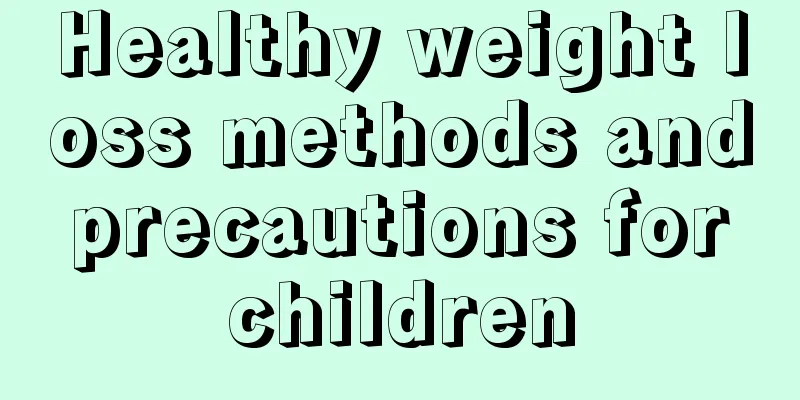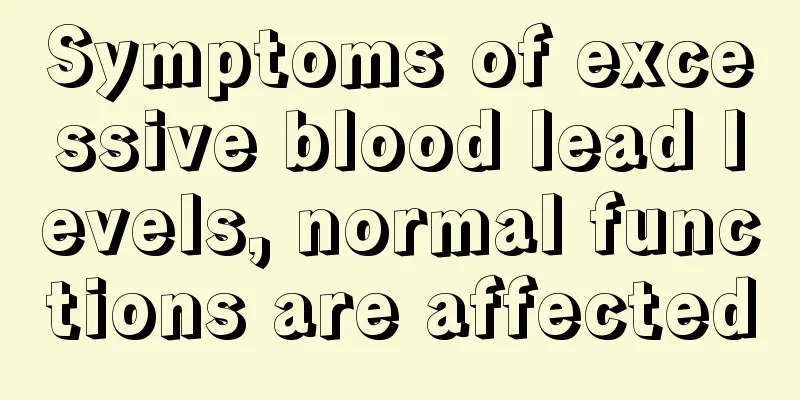Is anemia serious for an eight-month-old baby?

|
Infant anemia can occur at birth or during growth. So is anemia serious in eight-month-old babies? Babies grow very fast from birth to six months old, absorbing a lot of nutrients to make their bodies grow rapidly. However, as they get older, the nutrients cannot meet the body's needs, and they will lack a variety of nutrients, and their growth will slow down. It can be seen that anemia in babies at this time is very important, and many abnormal symptoms will appear, such as: 1. General manifestations Pale skin and mucous membranes are prominent manifestations. Due to the decrease in red blood cell count and hemoglobin content, the skin (face, earlobes, palms, etc.), mucous membranes (palpebral conjunctiva, oral mucosa) and nail beds appear pale. In severe anemia, the skin often appears waxy yellow and is easily misdiagnosed as combined mild jaundice. On the contrary, jaundice, cyanosis or other skin pigmentation changes can mask the symptoms of anemia. In addition, patients with a long course of illness often experience symptoms such as fatigue, dry hair, malnutrition, and physical retardation. 2. Hematopoietic and tracheal response In infancy, the function of hematopoietic organs is not yet stable. When the need for hematopoiesis increases, the extramedullary hematopoietic organs and tissues often show a proliferative reaction, returning to the hematopoietic state of the fetal period, with varying degrees of enlargement of the liver, spleen, and lymph nodes (extramedullary hematopoiesis is generally not enhanced in aplastic anemia), and nucleated blood cells and immature granulocytes may appear in the peripheral blood. 3. Symptoms of each system Circulatory and respiratory systems: The symptoms of these two systems are interrelated. When anemia occurs, due to tissue hypoxia, a series of compensatory functional changes may occur, such as increasing the ability to transport oxygen by increasing heart rate and breathing (more obvious after activity). Physical examination may reveal an accelerated heart rate, a stronger pulse, increased arterial pressure, and sometimes visible capillary pulsation. When the compensatory function of severe anemia is disturbed, heart enlargement, precordial systolic murmur and even congestive heart failure may occur. Digestive system: Gastrointestinal motility and the secretion of digestive enzymes are affected, resulting in loss of appetite, nausea, abdominal distension or constipation. Occasionally, there is glossitis and atrophy of the lingual papillae. Nervous system: Common symptoms include lack of energy, inattention, irritability, etc. Severe lack of oxygen to the brain tissue may cause fainting. Older children may experience headaches, fainting, black spots in front of their eyes, or tinnitus. Is anemia serious in an eight-month-old baby? Anemia in babies is a very serious phenomenon. The symptoms introduced in this article are the symptoms that will appear after the baby is anemic. These discomforts will cause the baby's growth to be restricted, and the personality will also be affected. Parents will be more tired when taking care of the baby. When the baby has similar symptoms, it is necessary to go to the hospital for anemia examination to accurately diagnose the type of disease, and it will be easier to treat it at this time. |
<<: What are the effects of anemia in infants?
>>: What are the symptoms of anemia in infants?
Recommend
Why do children have convulsions?
People often experience convulsions in life. In c...
Surgery for cerebral palsy in children and other treatments
I believe many people should know about cerebral ...
What should I do if my baby still can't crawl after eight months?
When there are babies at home, the daily topic re...
What medicine should children take for vomiting and diarrhea
We all know that children are most likely to suff...
How many months old is the baby easier to take care of?
Raising a child is not an easy thing, nor is it a...
Is it normal for a three month old baby to drool?
Many times, babies' saliva will often flow ou...
What to do if a three-year-old baby has diarrhea
Parents certainly hope that their babies can grow...
What are the adverse reactions to measles vaccination in children?
Parents who take their children to get the measle...
What kind of exercise can help children grow taller?
Both parents and children themselves may hope to ...
What should I do if my baby has green stools during the confinement period?
After giving birth, the mother may not take good ...
Baby's forehead is hot and his hands and feet are cold
If you find that your baby has a hot forehead and...
What to do if your baby cries and won't sleep at night
New mothers all have this problem, that is, their...
How to make lean meat porridge for August babies
When the baby is about five months old, parents w...
When can babies use pacifiers
Babies who have just been born are the ones that ...
How to treat children's rotten feet
Rotten feet is what we often call tinea pedis. It...









